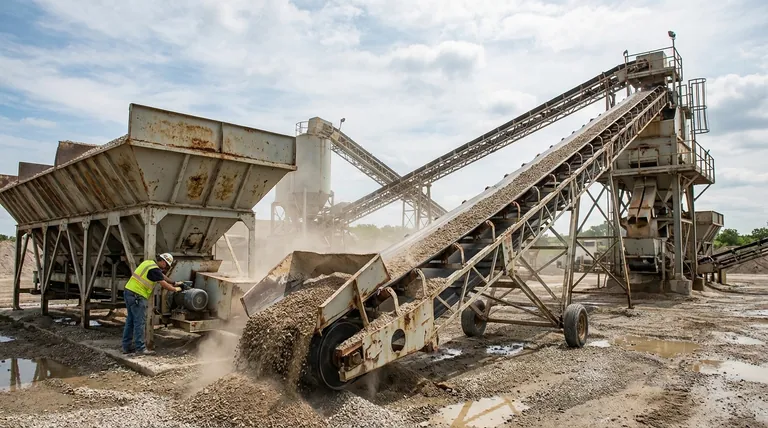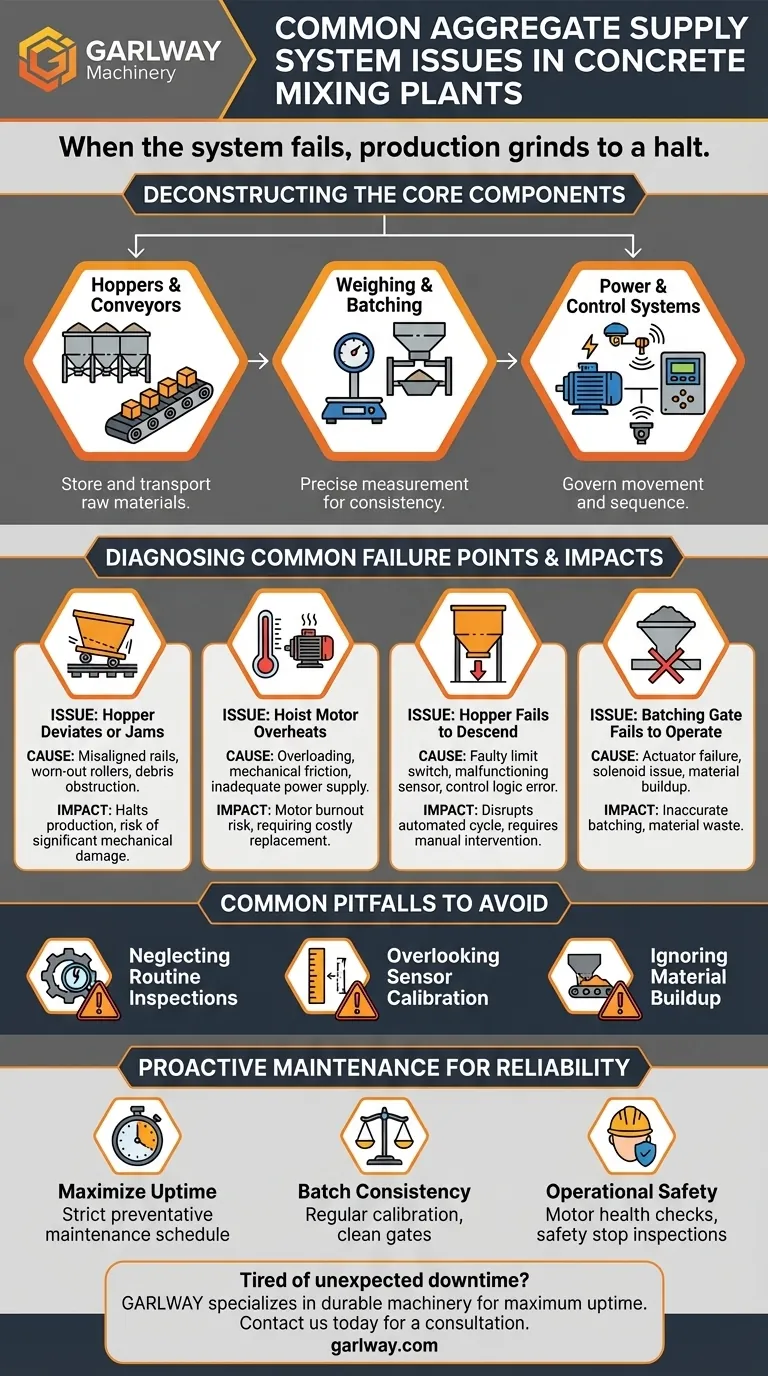When an aggregate supply system fails, the entire concrete production process grinds to a halt. The most common issues are mechanical and electrical in nature, typically involving the aggregate hopper deviating or jamming, the hoist motor overheating, the hopper failing to descend after unloading, or the batching mechanism's material gate failing to open or close correctly.
These failures are rarely sudden. They are typically symptoms of underlying issues in mechanical alignment, sensor accuracy, or motor stress, underscoring the need for a diagnostic mindset rather than a purely reactive one.

Deconstructing the System's Core Components
To understand the points of failure, we must first understand the system's function. The aggregate supply system is responsible for storing, weighing, and conveying sand and gravel to the main mixer.
The Role of Hoppers and Conveyors
Storage hoppers hold the raw aggregate materials. A conveyor system, often a belt or a skip hoist, then transports these materials from the hoppers to the weighing system.
The Importance of Weighing and Batching
The weighing system uses electronic devices to ensure the precise amount of each aggregate is included in the mix. The material gate of the batching mechanism then opens to release the weighed materials for conveyance.
The Power and Control Systems
Electric motors, particularly the hoist motor, provide the power for transport. The entire sequence is governed by a control system that relies on sensors and limit switches to execute commands correctly.
Diagnosing Common Failure Points
Each common issue points to a specific set of potential causes. A systematic diagnosis is key to minimizing downtime.
Issue: The Hopper Deviates or Jams
A skip hopper that gets stuck or runs off its track is often a sign of a physical problem. This can be caused by misaligned rails, worn-out rollers, or debris obstructing the pathway.
This failure immediately stops production and can cause significant mechanical damage if not addressed.
Issue: The Hoist Motor Overheats
An overheating motor is a critical warning sign. The root cause is typically excessive strain, which can result from overloading the hopper, mechanical friction from misaligned parts, or an inadequate power supply.
Ignoring this can lead to motor burnout, requiring a costly and time-consuming replacement.
Issue: The Hopper Fails to Descend
When a hopper unloads but doesn't return as programmed, the issue is often electrical or sensor-related. A faulty limit switch, a malfunctioning sensor, or a logic error in the control system may fail to signal the hopper to descend.
This fault disrupts the automated production cycle and requires manual intervention.
Issue: The Batching Gate Fails to Operate
A material gate that won't open or close correctly points to a failure in its actuation system. This could be an issue with the pneumatic or hydraulic system, a faulty solenoid, or simply material buildup preventing a clean seal.
This problem directly impacts the accuracy of the concrete mix and can lead to significant material waste.
Common Pitfalls to Avoid
Many system failures are preventable and stem from operational oversights rather than inherent design flaws.
Neglecting Routine Inspections
Abnormal noises, vibrations, or jerky movements in the transmission system are early indicators of wear. Regular inspections of belts, rollers, and motors can catch these issues before they cause a breakdown.
Overlooking Sensor Calibration
The control system relies on accurate data from sensors and limit switches. If these components are dirty, misaligned, or uncalibrated, the system will make incorrect decisions, leading to errors like a hopper failing to stop or descend at the right time.
Ignoring Material Buildup
Aggregates, sand, and cement dust are abrasive and can accumulate on mechanical parts, sensors, and gate seals. This buildup increases friction, causes jams, and leads to premature component failure.
Making the Right Choice for Your Goal
A proactive approach focused on preventative maintenance is the most effective strategy for ensuring the reliability of your aggregate supply system.
- If your primary focus is maximizing uptime: Implement a strict preventative maintenance schedule that prioritizes checking and lubricating all mechanical wear points, especially hoist rollers and conveyor belts.
- If your primary focus is batch consistency: Regularly calibrate the electronic weighing systems and ensure batching gates are clean and operating without obstruction or delay.
- If your primary focus is operational safety: Make motor health checks and inspections of all emergency stops and limit switches a non-negotiable part of your daily routine.
A systematic approach to monitoring and maintenance transforms the aggregate supply system from a potential liability into a reliable asset.
Summary Table:
| Common Issue | Primary Cause | Key Impact |
|---|---|---|
| Hopper Deviates/Jams | Misaligned rails, worn rollers, debris | Halts production, risk of mechanical damage |
| Hoist Motor Overheats | Overloading, mechanical friction, power issues | Risk of motor burnout, costly replacement |
| Hopper Fails to Descend | Faulty limit switch, sensor malfunction | Disrupts automated cycle, requires manual reset |
| Batching Gate Fails | Actuator failure, solenoid issue, material buildup | Inaccurate batching, material waste |
Tired of unexpected downtime from your aggregate supply system?
GARLWAY specializes in durable construction machinery designed for reliability. Our concrete batching plants, mixers, and winches are built to withstand demanding conditions, helping construction companies and contractors worldwide maximize uptime and batch consistency.
Let our experts help you select the right equipment or provide solutions for your current system. Contact GARLWAY today for a consultation and keep your concrete production running smoothly.
Visual Guide

Related Products
- Portable Concrete Mixer Machine Equipment for Mixing Concrete
- Ready Mixer Machine for Construction Ready Mix Machinery
- Commercial Construction Mixer Machine for Soil Cement Mixing Concrete
- Hydraulic Concrete Mixer Machine Cement Mixing Equipment for Mixture Concrete
- HZS120 Ready Mix Concrete Batching Plant Commercial Mud Cement Mixer
People Also Ask
- What are the main steps in operating a concrete batch plant? Master the 4-Stage Production Process
- How are concrete plants controlled? Achieve Precise, Automated Batching for Superior Concrete Quality
- How is powder batching handled in a concrete batching plant? Ensuring Precise Mix Quality
- What measures can be taken to reduce noise pollution in concrete mixing stations? A Strategic Guide
- What are the production capabilities and applications of concrete batching plants? Find the Right Plant for Your Project
- What type of belt conveyor is suitable for sites with limited space? Use High-Incline Sidewall Conveyors
- What is the name of the machine used in ready mix? Unpacking the Complete Concrete System
- What are the advantages of small and medium concrete mixing stations? Maximize Cost-Effectiveness & On-Site Flexibility


















